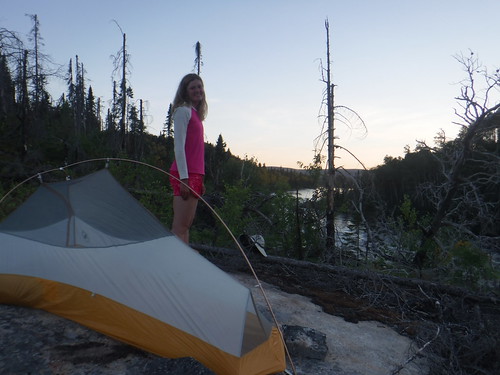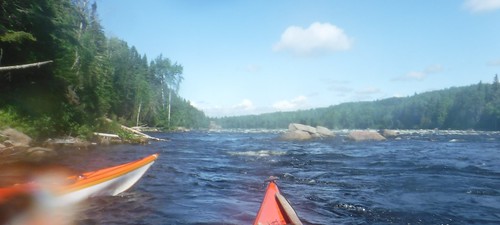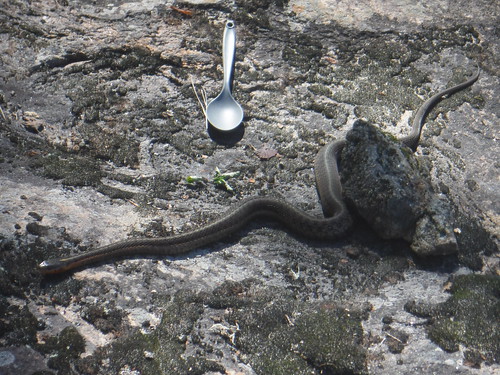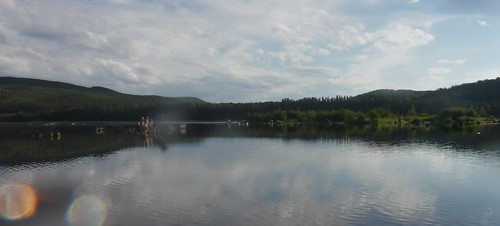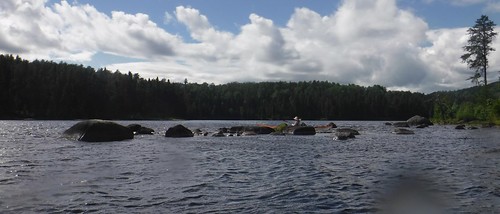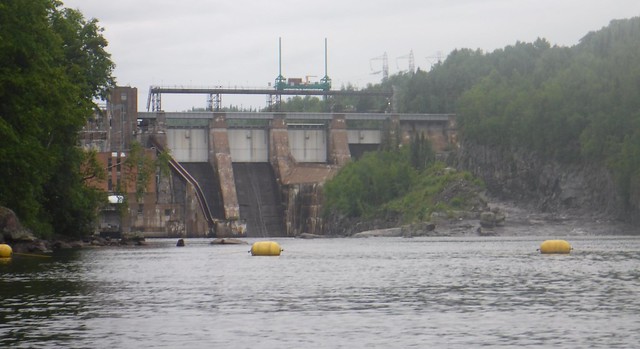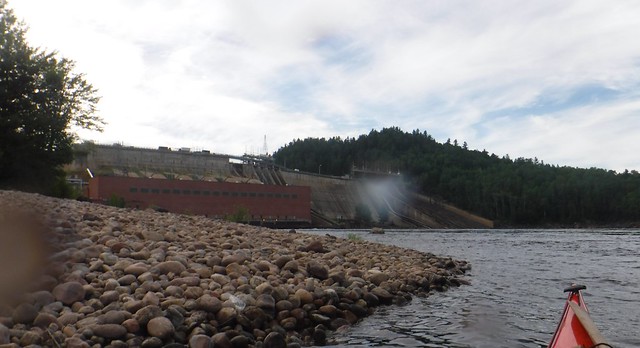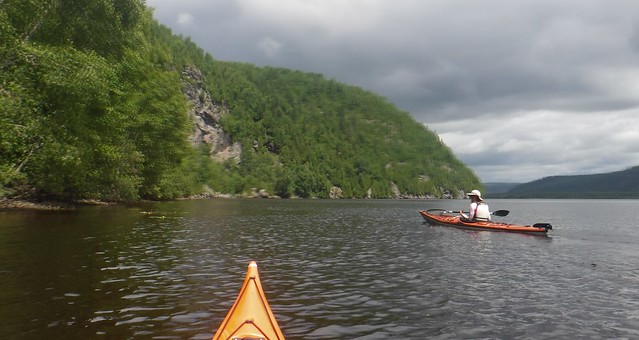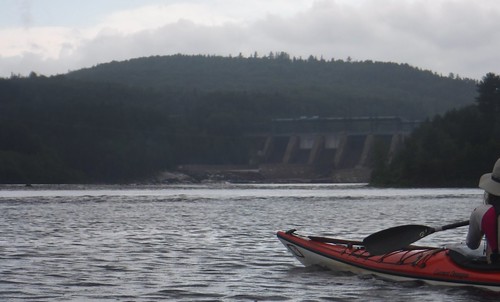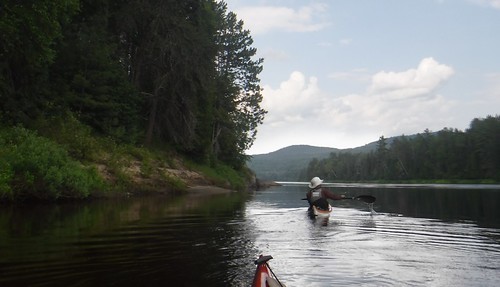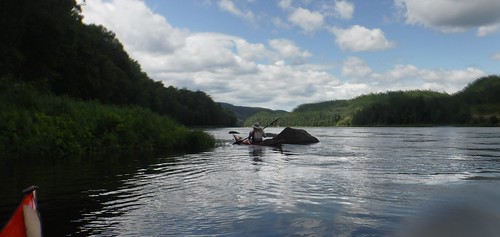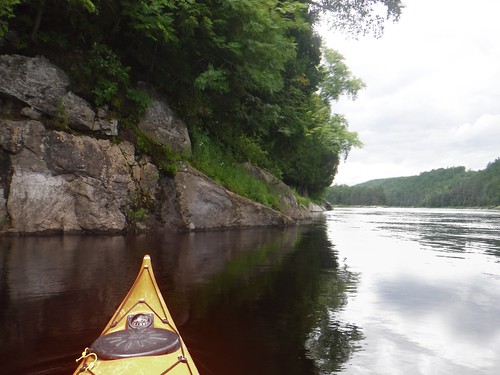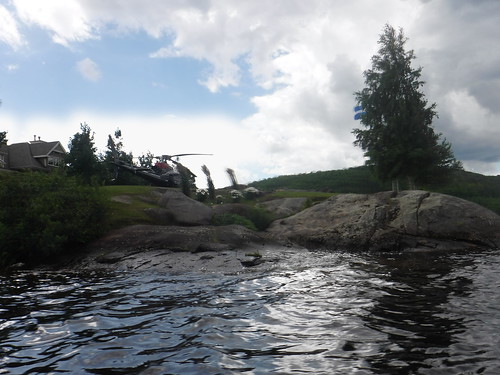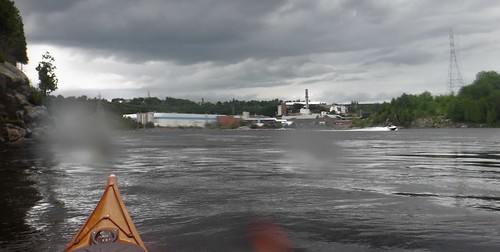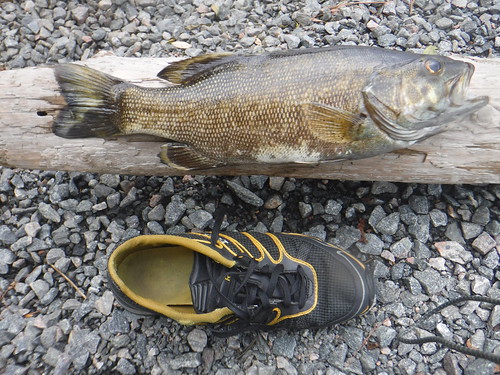We had a little bit of portage left for Sunday morning. With a few more back and forths, we were on the water by eleven. Richard hoped to see us off, helped us with some of the gear, and was only a little surprised by how long it took.
With all of our supplies, portaging took about five heavily laden trips, followed by packing the boats from scratch. I took my shoes off at the end and threw them into the cockpit. Ordinarily I would have put them in a hatch, but with such a late start I rushed past that.
We said goodbye to Richard and set out. After twenty minutes, feeling around inside of my boat, I discovered I only had one shoe in there. We paddled back to the put-in, and looked around for the missing shoe. Richard came down from the tracks, he’d been waiting for his train. He hadn’t seen my missing shoe. I’d lost it. Richard tried to give me his shoes. I couldn’t accept.
Going forward I’d wear my booties. When dry, they weren’t so bad with socks.
We put back in and headed up the river. We paddled up a tiny first current with a push and past a sacred first nations island.
Then we got to the second set of rapids. No matter how fiercely I sprinted, I could not climb up the falling water. We got out, and carried our boats over some rocks on the right side of the river.
For the third, and final set, we saw the cliff that Richard told us to portage up. At the top, as he described, stood a cross remembering the loggers who had tied in these rapids.
We tried paddling through the current to the cliff. The force of a jet off a rock swung my bow into the main current, and in a moment, the river pinned me sideways, my bow against one rock and my stern against another.
With all my might, the strongest of strokes and the most dexterous of hip wiggles, I could not free myself. When I tried too hard, the river scuked me down, and I skulled for my life and stayed upright.
Erin watched from a short distance up river. Neither of us had any idea how she could help.
Without any other ideas coming to mind, I got out. The current raged around me, but I held onto my boat, and found I could stand. I pulled my boat free, and we convened on a beach a short distance downstream
We began searching through the woods for a path to portage to the base of the cliff. We found some paths, that seemed to go in various directions, but they always turned into nothing. A fire had rushed through the forest a few years earlier, and left all the trees burnt out husks, some ready to fall with the slightest push.
The sun shined down, passed the dead branches, onto a field of fallen trunks and blueberry bushes. As we walked and climbed through the maze of fallen trees, we snaked through an endless supply of blueberry deliciousness.
We didn’t find a path. We returned to our boats. The water had risen and they floated, tangled in fishing line, caught in water weeds. We ran toward them, and then began the arduous work of untangling them. We’d grown used to the slow, meticulous process of untangling the line. It frequently caught on weeds and formed knots, and nothing could be done about it except cut it, though we didn’t have enough, or untangle it.
We put back in the water and headed upstream again. When we got to the spot where I’d been pinned, we got out and pulled the boats up stream along the side. The current soon became too strong and the water too deep. We needed to pull the boats over rocks. We tied one boat, and carried the other over. Then worked together to get it to the bottom of the cliff where we tied it to more rocks.
After repeating the process with the second boat, sometimes chest deep as we scrambled up the river, we were ready to begin our ascent of the cliff. First we double checked that the portage wasn’t on the bottom of the cliff.
We climbed the cliff and set up two ropes at the top. One to climb, and one with a pulley for the boat. We scouted out the top of the hill, and didn’t find the path. But Richard told us it would be up there, and we found some good candidates to search more thoroughly in the morning.
At the top of the cliff we found a small ledge before boulders, brush, and more cliff. It seemed like the portage started there, so we hauled everything up. We did not find quite enough room to pitch the tent without fear of falling back down the cliff in the night, so we climbed the boulders to a field of blueberries, and pitched the tent on the bald top of the hill surrounded by blueberry breakfast.
With the river flailing below, and a view in every direction, we rested in the prettiest camp I’ve ever made.
